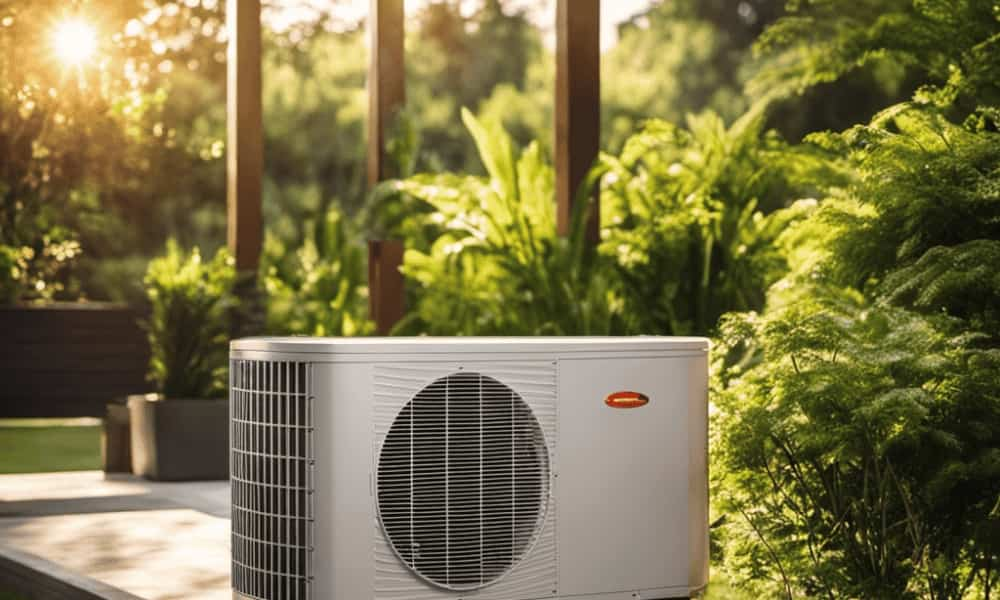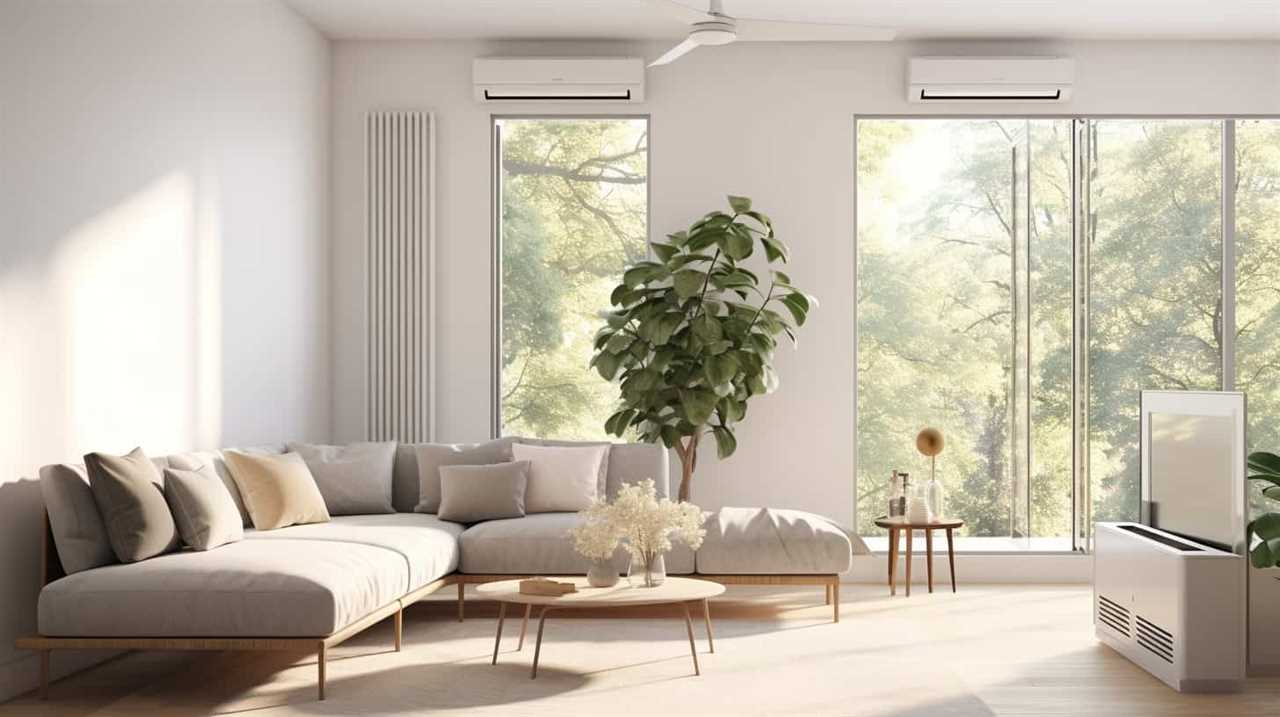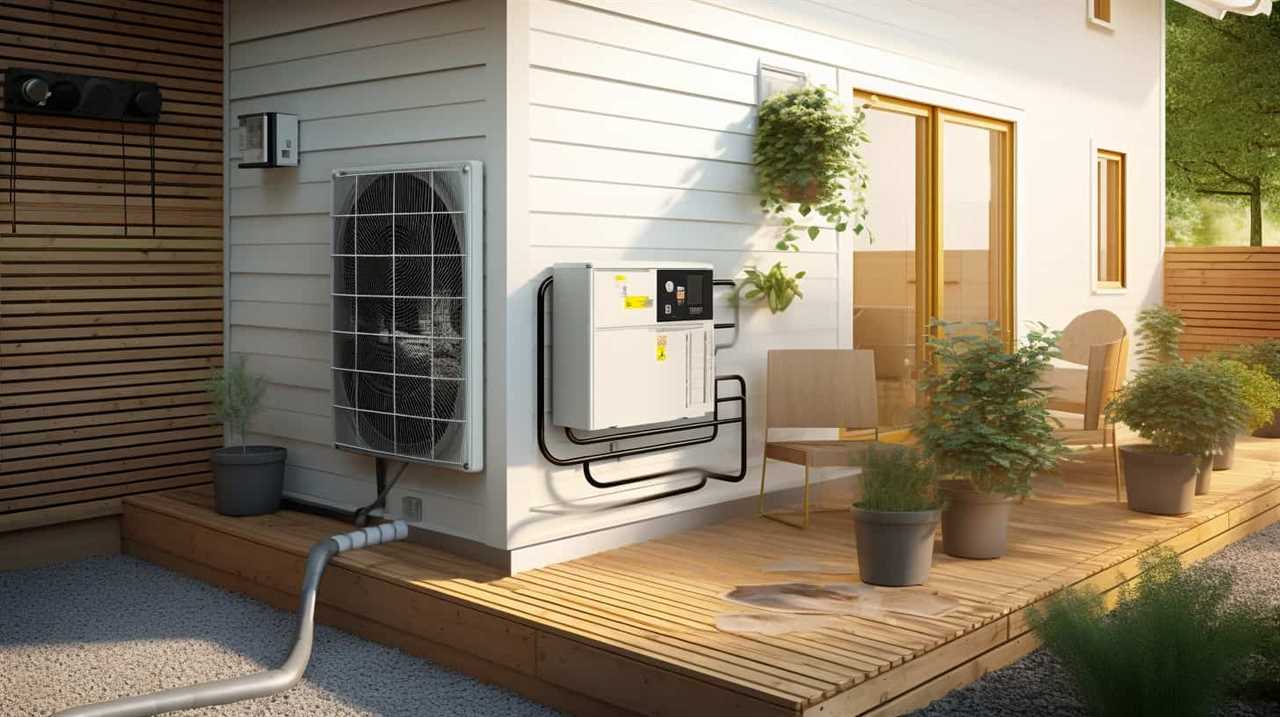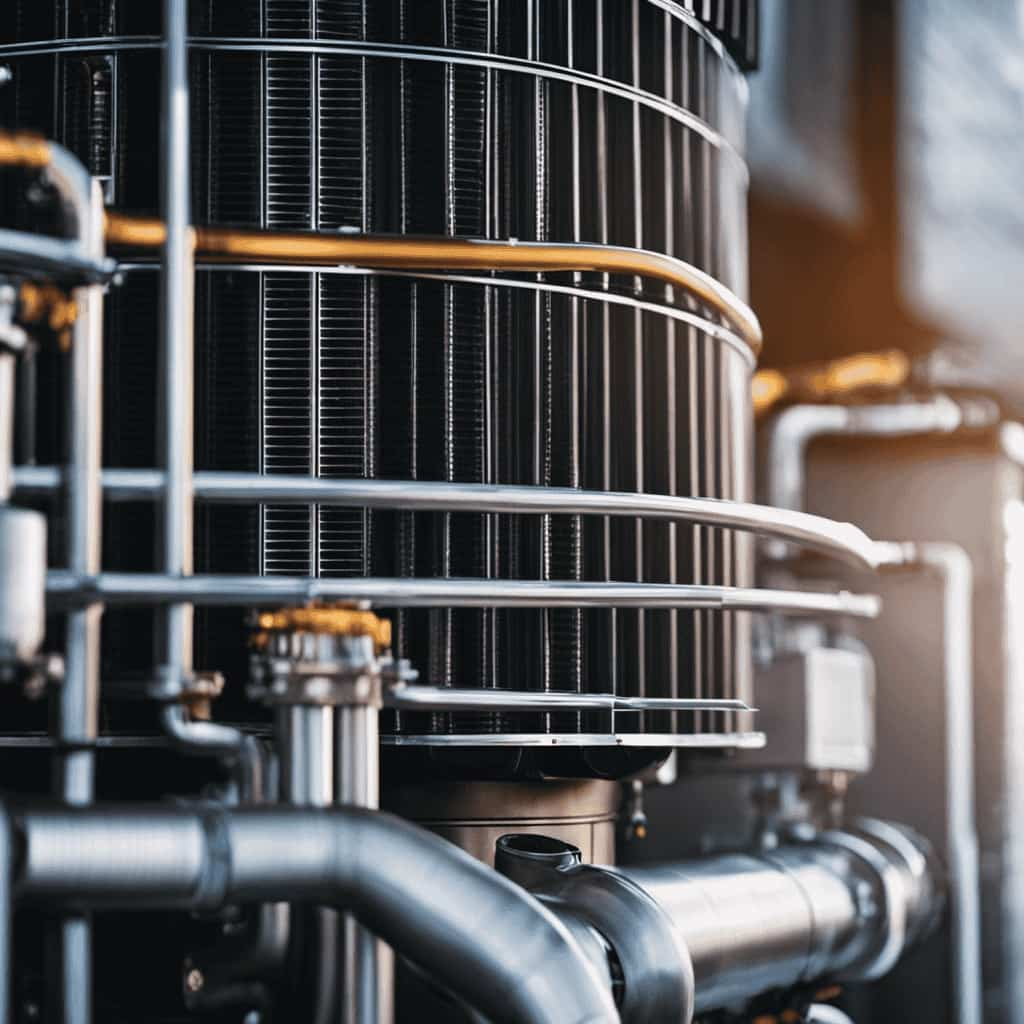Folks, it’s time to enhance the energy efficiency of your HVAC heat pump. Come along on this journey towards improved performance and saving costs.
In this article, we will unveil the secrets behind heat pump efficiency ratings, explore factors that impact energy efficiency, and guide you through the process of upgrading to a high-efficiency model.
Get ready to liberate yourself from sky-high bills and embrace a greener, more efficient future.
Let’s dive in!

Key Takeaways
- Upgrading to a higher SEER-rated heat pump can qualify homeowners for energy efficiency incentives and rebates.
- Good insulation, proper ductwork, and energy-efficient windows contribute to energy efficiency.
- High-efficiency heat pumps use advanced technologies to maximize energy efficiency.
- Regular maintenance, including cleaning and filter replacement, ensures optimal performance.
Understanding Heat Pump Efficiency Ratings
Let’s delve into the topic of heat pump efficiency ratings to enhance our understanding of how these ratings impact energy efficiency.
Heat pump efficiency ratings are measured in SEER (Seasonal Energy Efficiency Ratio), which is a numerical representation of how efficiently a heat pump can cool or heat a space.
The higher the SEER rating, the more energy efficient the heat pump is, resulting in lower energy consumption and utility bills.
Improving heat pump performance can be achieved by selecting a heat pump with a higher SEER rating, as it indicates better efficiency and performance.

Upgrading to a heat pump with a higher SEER rating can also qualify homeowners for energy efficiency incentives and rebates.
Key Factors Affecting Energy Efficiency of Heat Pumps
To maximize energy efficiency, we need to consider the key factors that affect the performance of heat pumps.
By understanding these factors, we can implement energy saving tips and address common heat pump problems to ensure optimal efficiency.
One important factor is the size of the heat pump. An oversized unit will cycle on and off frequently, leading to energy wastage. Conversely, an undersized unit will struggle to meet the heating or cooling demands, resulting in reduced efficiency.

Another factor to consider is the insulation of the house. Good insulation minimizes heat loss in the winter and heat gain in the summer, allowing the heat pump to operate more efficiently.
Proper maintenance is also crucial. Regular cleaning and filter replacement will prevent airflow restrictions and ensure optimal performance.
Upgrading to a High-Efficiency Heat Pump Model
We recommend considering upgrading to a high-efficiency heat pump model to achieve superior energy efficiency. Here are three reasons why:
-
Smart Thermostat Integration:
High-efficiency heat pumps often come equipped with smart thermostat integration. This allows you to control and optimize your heating and cooling settings from anywhere using a smartphone or other smart devices. By intelligently adjusting the temperature based on your preferences and schedule, you can maximize energy savings and minimize waste.
-
Government Incentives:
Many governments offer incentives and rebates for upgrading to high-efficiency heat pump models. These incentives can help offset the initial cost of the upgrade, making it more affordable for homeowners. By taking advantage of these programs, you can’t only save money upfront but also enjoy long-term energy savings. -
Enhanced Energy Efficiency:
High-efficiency heat pump models are designed to operate more efficiently, using less energy to heat or cool your home. They utilize advanced technologies, such as variable speed compressors and improved insulation, to maximize energy efficiency and reduce your carbon footprint. Upgrading to a high-efficiency heat pump can significantly lower your energy bills while keeping your home comfortable.
Best Practices for Maintaining Heat Pump Energy Efficiency
By following these simple tips, we can ensure the optimal energy efficiency of our heat pump.
Seasonal maintenance is crucial for maintaining the efficiency of our heat pump.

First, regularly clean or replace the air filters to ensure proper airflow. Clogged filters can restrict airflow, making the heat pump work harder and use more energy.
Second, clean the outdoor unit regularly to remove debris, such as leaves and dirt, that can obstruct airflow. This allows the heat pump to function efficiently.
Additionally, check the refrigerant levels and ensure they’re at the recommended levels. Low refrigerant levels can reduce the heat pump’s efficiency.
Lastly, consider using a programmable thermostat to set temperature schedules and optimize energy usage.

These energy-saving tips will help us maintain the energy efficiency of our heat pump and reduce our energy consumption.
Advanced Technology Solutions for Optimizing Heat Pump Efficiency
Incorporating advanced technology solutions can significantly enhance the efficiency of our heat pump. By integrating a smart thermostat, we can achieve precise control over the temperature settings, allowing us to optimize energy usage and reduce wastage. The smart thermostat can learn our preferences and adjust the settings accordingly, ensuring optimal comfort while minimizing energy consumption.
Additionally, the use of variable speed compressor technology can greatly improve the efficiency of our heat pump. This technology allows the heat pump to operate at different speeds, adjusting to the specific heating or cooling needs of our space. By running at lower speeds when full capacity isn’t required, we can save energy and reduce wear and tear on the system.
Frequently Asked Questions
How Does the Size of a Heat Pump Affect Its Energy Efficiency?
The size of a heat pump directly affects its energy efficiency. Factors such as the size of the space to be heated or cooled, insulation, and climate should be considered when determining the appropriate size for optimal energy efficiency.

Are There Any Government Incentives or Rebates Available for Upgrading to a High-Efficiency Heat Pump?
There are government incentives and rebates available for upgrading to a high-efficiency heat pump. These incentives can help offset the cost of the upgrade and promote energy savings in our homes.
Can a Heat Pump Be Used for Both Heating and Cooling Purposes?
Yes, a heat pump can be used for both heating and cooling purposes. It is a versatile system that provides efficient heat pump installation and offers the benefits of using a single system for both heating and cooling.
What Is the Expected Lifespan of a High-Efficiency Heat Pump?
The expected lifespan of a high-efficiency heat pump is typically 15 to 20 years. It offers superior energy efficiency, reducing our carbon footprint and saving us money on energy bills.
Are There Any Specific Maintenance Tasks That Homeowners Can Perform to Improve the Energy Efficiency of Their Heat Pump?
Homeowners can improve energy efficiency of their heat pump by performing regular maintenance tasks. These tasks include cleaning or replacing air filters, checking and cleaning coils, and ensuring proper airflow.

Conclusion
Upgrading your HVAC heat pump to a high-efficiency model is a game-changer for superior energy efficiency. It’s like unlocking a whole new level of savings and comfort in your home.
With advanced technology solutions and best practices for maintenance, you can optimize the efficiency of your heat pump even further.
So go ahead and make the switch, and experience the exhilarating power of energy savings!









